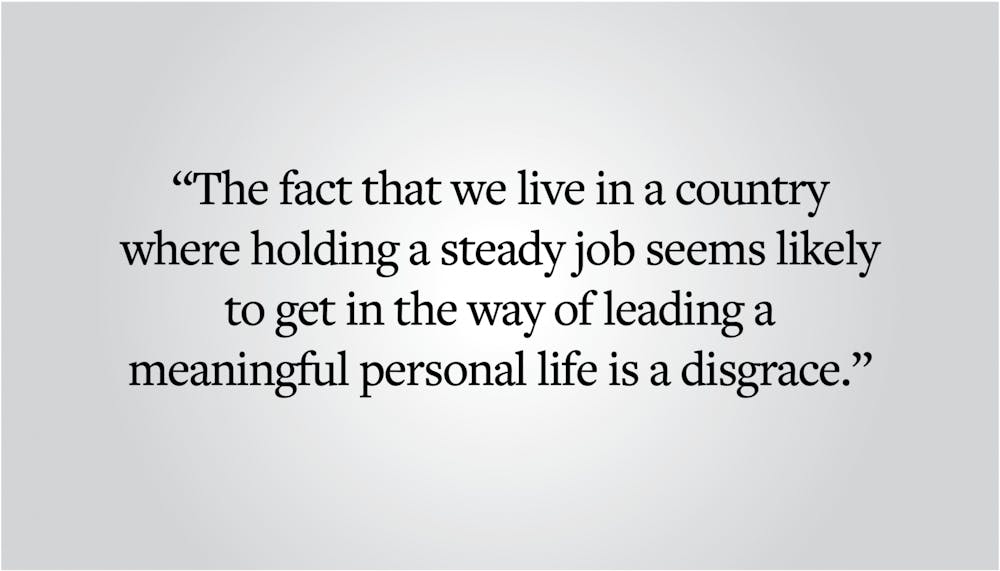This is my final semester at Brown. As I dove head-first into the stressful process of job hunting, I discovered a troubling pattern — how little paid time off was offered by many entry-level jobs. Among the jobs I was looking at, the most common amount of PTO offered was two weeks annually. As a college student accustomed to month-long winter breaks and entire summers off, I couldn’t wrap my head around this pitiful number of days. The necessity of paid vacation leave hadn’t crossed my mind until directly confronted with the realities of the workforce.
All the entry-level jobs I found seemed as though they were designed with the explicit purpose of exploiting the spry youthfulness and optimism of recent graduates by monopolizing their time. How was I supposed to relax, visit my loved ones and keep up with my passions within the measly timeframe of half a month? It would not have been possible. Currently, businesses in the U.S. aren’t required to provide their employees with paid leave for vacations. But workers are still entitled to paid leave for vacations, and legislation must be put in place to hold businesses accountable.
According to the United States Bureau of Labor Statistics, the average paid vacation leave offered to workers after one year of service is 11 days. But even after 20 years of work, average paid vacation days hover around 20 days. The U.S. is the only advanced economy that doesn’t legally require that businesses provide PTO for vacations. And the average American vacation time of 15 days per year falls short of the minimum vacation time off mandated by law among 19 of the world’s other richest countries.
Under the Fair Labor Standards Act, employers are not required to provide their workers paid time off, including for vacation, sick days or even federal holidays. While Rhode Island law requires employers with at least 18 employees to offer paid sick and safe leave, there is still no requirement in place for paid vacation time.
The provision — or lack thereof — of paid time off (PTO) is up to the discretion of employers, who still maintain significant power over their employees: Roughly one in four workers get no paid vacation time.
However, studies have shown that vacations are important for health. Individuals who spend more time on vacation have a lower risk of developing heart disease, stronger immune systems and improved mental health. Denying individuals PTO for vacations not only deprives them of much-earned time to spend relaxing, visiting family and pursuing their interests, but it also robs them of a higher quality of life.
When researching this topic, I was frustrated by how many articles emphasized how offering paid time off helps both employees and employers because it promotes productivity. This is besides the point: Offering PTO for vacations should not be justified by how they can serve faceless organizations. Truly, vacations restore the health of workers and that is important in and of itself. Lawmakers have a responsibility to advocate for their constituents, the vast majority of whom are employees, not employers.
Work should not constitute the entirety of anyone’s life and cultivating a society where that is the expectation only serves those who do not need to work.
I am lucky to have the privilege of attending graduate school next year, but that only delays my inevitable entry into a demanding and unsustainable work culture. However, graduate school isn’t an opportunity available to everyone, and even if you get in, there’s no guarantee that your studies will be funded. I originally didn’t plan to go to graduate school immediately after graduating from Brown. However, given the climate of American workplaces, going straight into the workforce didn’t seem like a life I wanted to live.
I had to make a decision between having an all-consuming work schedule or accumulating debt by attending a graduate program with no assurance of future employment. The fact that we live in a country where holding a steady job seems likely to get in the way of leading a meaningful personal life is a disgrace. Living in the U.S. should be about more than being overworked, and requiring businesses to provide significant paid vacation leave would be a first step in dismantling the exploitative system currently in place.
Megan Slusarewicz ’23 can be reached at megan_slusarewicz@brown.edu. Please send responses to this opinion to letters@browndailyherald.com and other op-eds to opinions@browndailyherald.com.





